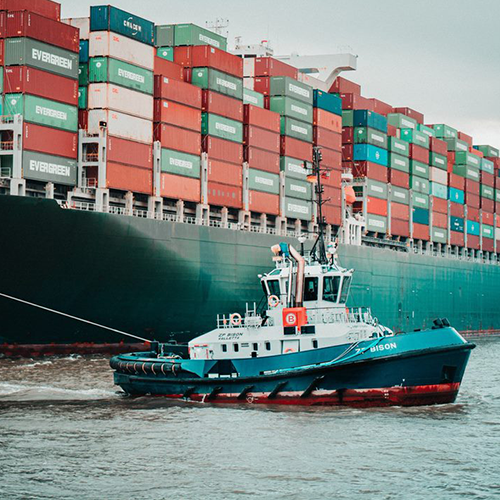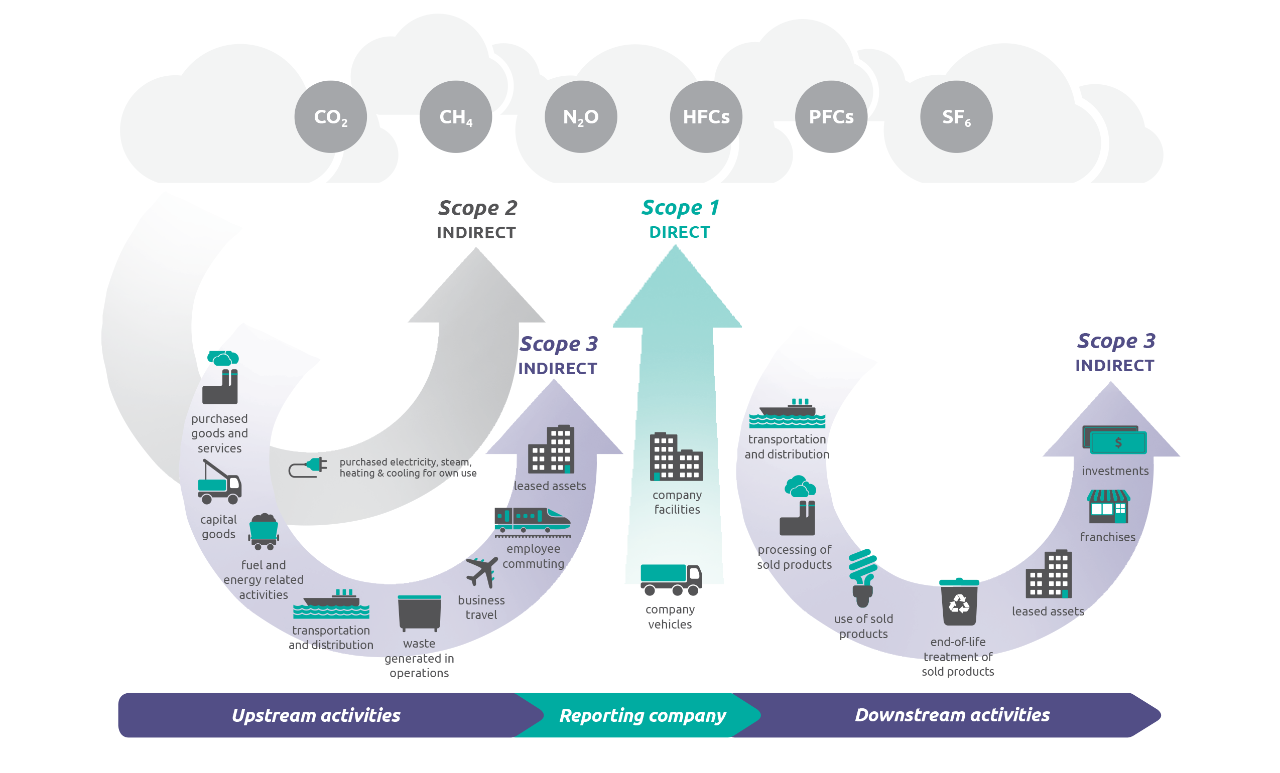Embracing Sustainability: Actions for SMEs
Introduction
Who is this guidance for?
This guidance is for those who own or work in Small and Medium-sized Enterprises (SMEs), and for those small and medium-sized practitioners who advise them. We have heard a lot about sustainability and climate change in recent years, but how do these issues relate to running a small business in difficult times, and how familiar are you with what they mean in practice? The aim of this guidance is to help you – as an SME owner, employee or advisor – to see how you can embed sustainability in your business and understand its benefits.
Sustainable development: The ability to satisfy the needs of the present generation without adversely affecting the conditions for future generations.1 Climate change: Climate change refers to a change in the state of the climate that can be identified (eg by using statistical tests) by changes in the mean and/or the variability of its properties and that persists for an extended period, typically decades or longer.2 |
Why is this important?
The active involvement of SMEs in response to the environmental and social challenges we are currently facing is crucial if national policy goals of sustainable development are to be achieved.
In most countries, the majority of businesses are SMEs which contribute to the creation of jobs and overall economic wellbeing. They represent about 90% of businesses and more than 50% of employment worldwide.3 SMEs, by virtue of their prevalence and collective economic importance, are every bit as relevant to the issue of sustainable development as larger organizations. SMEs account for an estimated 70%4 of industrial pollution in Europe and produce 29.7 million tCO2 of emissions across Southeast Asia annually.5 Governments are establishing ambitious targets and policies to reduce greenhouse gas (GHG) emissions and achieve more sustainable economies that are less reliant on fossil fuels. The SME sector is appreciated as key to making real progress in this area.
Sustainability issues are already affecting SMEs. As an SME, if you do business with large companies or public bodies, you are part of an extended supply chain. As a result, you may be expected to follow prescribed procedures and practices in a number of areas, including sustainability. Raising finance may be dependent upon addressing conditions laid down by the lender regarding sustainability issues. Further, there may be opportunities for you as a business to help tackle a range of social and environmental issues.
Research suggests that there is real potential for SMEs to expand their activities in the area of sustainable business and benefit the wider economy. Research by E.ON in 2020 found that the pandemic had caused a big shift in consumer behaviour – more than one third (36%) of UK citizens surveyed stated they were buying products from companies with strong environmental credentials, and 80% said they were planning to purchase goods and services from businesses that they knew had made a concerted effort to be “environmentally friendly”.6
In the current challenging economic environment, finding ways to reduce use of energy and other resources will deliver both essential financial and environmental savings.
What does this guidance aim to do?
This guidance aims to introduce the sustainability agenda to those SME owners, employees and advisors who want a deeper understanding of how it relates to their businesses and how they might seize short- and long-term opportunities from this agenda. This guidance focuses on SMEs and the specific issue of climate change and also shows how support can be provided to SMEs from professional accountants and other external experts. Further resources are identified where more detailed information can be found for any of these issues.
Opportunities for SMEs
Increasing numbers of stakeholders are seeking more sustainable lifestyles and are selecting products or business practices that are more environmentally conscious and sustainable.7 Customers, employees and local communities are now pursuing higher standards and commitments to sustainability from all businesses, including those in the SME sector.
If your SME does business with larger companies and public bodies – or aims to – you will likely find you are expected to demonstrate the steps you are taking to incorporate sustainability measures into your business practices. This is typically formally assessed during the procurement process. Such commitments may also be sought in the process of raising finance and accessing loans.
SMEs may not have the economies of scale experienced by larger businesses, but they have the advantage of being agile and responsive to changing consumer trends, market demands and regulations that dictate changes to business practices. This agility is especially useful in areas such as branding, marketing and product development. The planning and implementation of sustainable business practices presents an opportunity for smaller businesses to reposition themselves creatively within this changing business landscape – a challenge that larger businesses may find more difficult to manage.
Embedding sustainability into your core business practices can add value in many ways, such as through:
- Enhancing your opportunities to conduct business with the increasing number of companies and public bodies that are either required by law to comply with specified standards of sustainability management or have chosen to adopt them.
- Saving on outgoings by focusing on how to improve resource efficiencies in your operations and production processes.
- Gaining a competitive advantage by attracting customers who appreciate businesses with environmentally and socially responsible practices.
- Involving your employees in decisions about how to become more sustainable as a business, which in turn boosts morale and improves job satisfaction.
- Preparing for regulatory changes that may impact SMEs.
- Accessing sources of finance only available to businesses with sustainable practices.
The impetus to integrate sustainability throughout your business model can come from a number of sources that are further explored in the following sections.
Supply Chain Management

We live in an interconnected world that is highly dependent on global supply chains that can, and frequently do, involve both large and small businesses. Whether an SME has just one, or several, large customers, ensuring customer satisfaction is invariably a critical component of its business plan. Consequently, SMEs that become part of supply chains need to be aware of their customers’ expectations and ensure they deliver accordingly.
Large companies are increasingly recognizing that the success of their business operations relies upon their supply chains. The COVID-19 pandemic and the Russian invasion of Ukraine in 2022 underlined the interlocking and interdependent natures of global commerce for everyone. For those at the top of these chains, effective supply chain management helps mitigate disruptions, improves efficiencies, increases customer satisfaction and enhances competitiveness. Further, large companies are progressively subject to sustainability-related regulatory and reporting requirements that address impacts and performance in diverse areas across their full value chain. In the UK, for example, the Modern Slavery Act requires large companies to review their supply chains and to report publicly on the steps being taken to ensure that slavery is not present at any point in the chain. In response to these developments, large companies are becoming more closely involved with the companies in their supply chains in order to enhance their resilience and to ensure that regulatory requirements are fully met.
Higher expectations for sustainability standards are also being set by those at the top of the chain to ensure alignment between their own commitments and the sustainability practices of their suppliers. The standards expected by companies at the top of the chain are not always imposed by law or regulation – companies and public bodies often lay down their own conditions that must be met by their trading partners. For example, the City of Vancouver implemented a Social Value Procurement Framework in 2019 to encourage staff to procure services from vendors that had a social purpose or that were diverse. They started out with a target that 50% of their procurement contracts would be awarded to social or diverse businesses within three years. Research indicated that social procurement could have a multiplier effect, generating CA$3 for every CA$1 spent. Finance teams analysed historical trends when procuring services and establishing new contracts with social/diverse businesses, and then developed dashboards and targets for measuring performance.8
This example from Canada shows how large companies and public bodies are increasingly imposing wide ranges of conditions, both commercial and non-commercial, on the organizations with which they interact. Adnams a UK brewer, also demonstrates a similar strategy which can benefit those SMEs adopting a sustainability approach. They advocate that “Sustainability is at the heart of what we do. From selecting the suppliers that we work with or the ingredients we use, through to the services we offer in our stores, pubs, and hotels, it guides our decisions, and helps us do the right thing. We want to continue making a positive difference, and we believe it is vital to our long-term success.9 This is supported by its CEO, Andy Wood, OBE DL, CEO, who has stated, “We believe that sustainability should not be treated separately to core business and it is embedded throughout every decision the business makes.10
“The case for action to underpin social issues such as human rights, equality, safe working conditions and a living wage has never been stronger, and the ease with which these could be managed and enforced has never been greater. Businesses that actively engage with their full supply chains and incorporate these issues into their daily suite of performance indicators and policies will see rewards.”11 Ian Ellison, Senior Associate, Cambridge Institute for Sustainability Leadership |
Those SMEs that aspire to contract with larger firms and public bodies will need to start considering how they might be impacted by these requirements. Working proactively to address them will enhance their prospects of working with those organizations. Many large organizations are formally adopting a collaborative approach by working closely with the SMEs in their value chain to share best practice and support performance improvements. Access to this knowledge and expertise can be a key advantage to SMEs and a further incentive to take action.
Many companies (such as KPMG, Microsoft and Volvo) produce supplier sustainability codes that their suppliers are required to sign and implement as conditions of doing business. As an example of this approach, US software company Salesforce brought climate action into its standard supplier contract in 2021 through a four-page ‘sustainability exhibit’ that operates as a legal appendix to the contract. Salesforce notified its suppliers that all future procurement agreements would include this sustainability exhibit, which requires suppliers to set science-based targets, disclose their Scope 1, 2 and 3 emissions and deliver carbon-neutral products and services. One target is for suppliers representing 60% of Salesforce’s Scope 3 emissions to set science-based targets of their own by 2024. Salesforce’s finance, procurement and sustainability teams collaborate to provide support to suppliers through webinars and conversations.12
Investors are also actively involved. To minimize their risks, many investors in large companies now seek information about the practices of the companies’ suppliers. This often has an indirect impact on those suppliers, as they can lose business through non-compliance. The UN’s Principles of Responsible Investment advises investors to “ensure investee companies are applying due diligence when identifying and managing environmental, social and governance (ESG) risks and opportunities with their direct suppliers of goods and services”.13 If suppliers are not aligned with the sustainability practices and expectations of the larger company, the credibility of the larger company’s commitment may be undermined. Some ramifications can include “plummeting share price, cancellation of commercial contracts, and major investors deciding to disinvest”.14
NEXT STEPS:
SMEs must be prepared to have their sustainability practices scrutinized by organizations higher up the supply chain (and downstream, for sectors such as product manufacturing). In order to continue working with business customers and gain competitive advantages, they should be prepared to be transparent about their operations and be willing to make changes (for example, adopting a recognized sustainability standard such as the ISO14001 Environmental Management System, which has a specific handbook to help SMEs).
You can begin by requesting the support of your employees; discuss why sustainability issues are important for the viability of your business. Measuring your sustainability impacts is key because it confirms your sustainability activity. Work with your employees to create or update the business plan to include capturing reliable data to provide accurate, timely, relevant and comparable sustainability information. Your professional accountant or an external advisor can help you with these steps.
What to measure will vary for each business, but could include the following:
Environmental: Environmental issues examine how a business performs as a steward of the natural environment. Resource efficiencies can be improved by measuring greenhouse gas (GHG) emissions as part of a wider energy management plan and by managing waste and water consumption. Smart meters can be installed to measure use and help to identify opportunities to save energy, reduce waste and decrease water usage. You may be able to lower costs and improve profits while reducing carbon emissions.
Social: Social issues look at how the business treats people and the society in which it operates. Identify where improvements can be made, including the wellbeing and diversity of your employees. Ensuring due regard for health and safety, securing customer loyalty and maintaining decent staff working conditions will enhance your social impact.
Governance: Governance issues include risks and opportunities in decision making, managing compliance and setting standards for the company. Position sustainability at the forefront of your business agenda, develop and update subsequent policies and practices and review your procurement processes.
Access to finance

| When SMEs are looking to grow, they typically need capital and will apply for loans, overdrafts and grants. Positive responses from lenders will depend on specific criteria having been met. Sustainability requirements are increasingly being included in the criteria set by banks, governments and other finance providers, with SMEs having to demonstrate their commitment to more sustainable practices and to disclosure of sustainability-related risks. |
Measuring and reporting on sustainability metrics can enable SMEs to access finance that may otherwise be unavailable. The growing momentum to achieve net zero has led countries around the globe to make new public grant finance available to SMEs that require certain sustainability requirements to be fulfilled as part of a procurement application. For example, the British Business Bank plc, a state-owned economic development bank, has highlighted a range of different funds and grant programmes available to SMEs in the UK.15 These grants aim to help SMEs make the transition to greener business models, such as those wanting to increase energy efficiency and reduce consumption.
The adoption of net zero targets has also encouraged the finance industry to accelerate its provision of capital investment and ‘green’, ‘social’ and ‘sustainability-linked’ loans to SMEs. These types of loans are conditional; the borrower must use the finance either for projects with an environmental focus or to work towards sustainability targets specified in the agreement. This lending market has seen enormous growth in recent years. In 2021, the total value of sustainable debt issued, including sustainability, social and green bonds and loans, amounted to over $1.6 trillion – an increase of 115% over 2020.16
As an example of the initiatives being taken, the retailer Tesco offers suppliers access to preferential financing rates if they commit to science-based emissions targets and carbon reporting. Finance rates are based on each supplier’s carbon data disclosure, emissions reduction targets and progress against sustainability goals. The scope of the sustainability data requirements are regularly updated in line with market best practice and Tesco’s own sustainability commitments. The retailer expects the programme to be of particular interest to SMEs, and it will provide online tools and support to help those suppliers enrol in the scheme.17 HSBC’s Green SME Fund is available for SMEs to finance environmental activities that will make them more sustainable. Examples of such activities include biodiversity conservation, renewable energy and sustainable transport.
NatWest Bank provide a similar loan that aims to help eligible UK businesses finance business assets to support their sustainability ambitions.
ABN Amro offers a transition loan that links sustainability targets to the amount of interest paid. If targets are met, the interest rate reduces.
Singapore bank UOB also offer a number of sustainable finance options for SMEs.
Banks will also be measuring their financed emissions as part of attaining their own net zero targets, so customer transparency in this will be essential. Banks are developing tools to support this. NatWest Bank’s stated goal is to be a “leading bank in addressing the climate crisis and lower our carbon footprint”.18 It has developed a Carbon Footprint Tracker to help others calculate their carbon footprint and to offer ideas about how it can be reduced. Lloyds Bank offers a Green Buildings Tool to help customers understand how to make their properties more sustainable and energy efficient, and it is piloting the use of carbon calculators with SME clients.
While traditional loan financing will not have a specific focus on sustainability issues, applications for such finance will invariably require the inclusion of a business plan that focuses on the viability and resilience of an organization’s business model. The lender will focus on how you address changes to the business environment with regard to sustainability matters, technology and new ways of working and marketing, as well as how your business plans to respond to those issues in order to secure its future and grow. Individual lenders will have their own policies regarding issues that are of the greatest significance to business resilience. However, a business plan that pursues more sustainable operational practices will likely be interpreted as an indication that you are aware of, and are responding to, the challenges and opportunities presented by the sustainability agenda.
NEXT STEPS
In addition to enhancing your relationships with existing customers and suppliers, taking steps to quantify the social and environmental impacts of your business and using that information to adapt your business model may open the door to new funding opportunities. The reputation of your business as one that is prepared to respond to the threats and opportunities present in today’s world may be reinforced:
- Analyse the financial position of your business and then determine your short-, medium- and long-term financing needs. Define the nature of your needs and whether there are opportunities to access sustainable financing (eg investing in new equipment that could reduce energy costs and improve efficiencies). Determine urgency and how the development of the business would be supported.
- Identify and research the different financing options that are available (eg grant funding, bank loans, equity, asset-based and alternative finance) and determine which is most appropriate. Consider conventional financing and green, social and sustainability-linked products.
- Speak to your bank or lender; some have developed special tools to support SMEs on sustainability.
- Clarify what type of information the lender of your choice must have to support a finance application and consider how reliable data can be sourced for this purpose. You can discuss this with your professional accountant or advisor.
Further resources
NetWest Carbon Footprint Tracker
Lloyds Bankreen Buildings Tool
Financing SMEs and Entrepreneurs 2022, OECD
Financing Green: a guide for SMEs, CBI
Financing SMEs for Sustainability, OECD
SMEs, Green Markets and Resource Efficiency, European Union
Investing in the Backbone of Emerging Markets, Boston College
Sustainable Debt Key to Financing Economic Transition, IFAC and CPA Canada
Carbon Footprint Tracker, NatWest
Sustainability Linked Loan Principles, Loan Market Association
Green Loan Principles, Loan Market Association
What you need to know about Green Loans, The World Bank
Accountants and Sustainability

SMEs know that professional accountants help prepare their annual accounts and tax returns and advise on financial management, on the setting up of internal controls and on all other matters relating to the efficient running of their operations. They can also help with making businesses more sustainable.
Legislation and accounting standards are increasingly requiring companies to supplement their financial data by disclosing a much wider range of information, such as risk, strategic vision and stakeholder management. Large companies in many countries are now required to measure and report data relating to a range of sustainability issues covering environmental, governance and social topics.19 These requirements will increase with the recent establishment of the International Sustainability Standards Board and the wide-ranging reporting requirements that are emerging in a number of jurisdictions, including the EU.
As the scope of corporate reporting has evolved, the training of accountants has also evolved. Today’s professional accountants need to develop a broad understanding of the range of challenges facing modern businesses and of the resources available to manage those challenges. Professional accountants who work primarily with SME clients, commonly called small- and medium-sized practices (SMPs), have special expertise and experience with regard to the circumstances of small and growing businesses. They must ensure they are able to offer expert advice on the costs and benefits likely to be associated with initiatives to reach net zero and to address other sustainability-related opportunities and challenges.
There are a number of areas where SMPs can focus on to be able to provide guidance and recommendations to support an SME’s management on sustainability matters. In the specific context of net zero and embarking on a journey towards a more sustainable business operation, professional accountants can broaden their expertise to be capable of advising SMEs on how to plan, capture, measure and analyse carbon emissions. On the strength of that, they can identify opportunities for alternative ways of working that might save money and reduce carbon footprints. They can also help with the process of implementing new environmental management systems and adopting any codes of practice that might equip the SME to win or retain contracts with large customers.
Although the nature of business reporting may have changed, ultimately the role of the professional accountant is still to work in the public interest, uphold ethical behaviour, add value to the client by maximizing opportunity, reduce inefficiencies and help to ensure long-term viability. Professional accountants help by ensuring that their clients are aware of matters that might affect their businesses and profitability. They make clients aware of market conditions and customer expectations. And, in the specific context of this guide, they can ensure their clients understand how the sustainable business agenda makes sense in their particular situations and help them to engage with it in a way that creates positive, long-term differences in their businesses.
The International Federation of Accountants (IFAC) has explored the services that SMPs can offer to SMEs in more detail, including:
- Capturing reliable data to provide sustainability information.
- Designing reporting, internal risk management and governance systems, and advice on process improvements.
- Optimizing sustainable and responsible business practices.
- Designing and monitoring indicators and sustainable goals based on the company’s strategy.
- Undertaking scenario analysis to facilitate risk assessments.
- Mapping of key stakeholders and identifying supply-chain risks and opportunities.
SME spotlight on climate change

For decades, governments and scientists have expressed the urgent need to manage and reduce GHG emissions, which unequivocally contribute to climate change. The Paris Agreement of 2015 details steps that national governments should take in their respective countries to reduce economy-wide reliance on fossil fuels and to achieve the target benchmark of what is called net zero. Halving global GHG by 2030 and reaching net zero by 2050 is key to stabilizing the climate and halting climate change.
What is the Paris Agreement and Net Zero? The Paris Agreement is a legally binding treaty that commits all signatories to halt global warming by the middle of the century by agreeing to pursue efforts to limit the increase of global warming to “well below 2, preferably to 1.5oC,”20 as "global temperatures will stabilize when carbon dioxide emissions reach net zero. For 1.5oC (2.7oF), this means achieving net zero carbon dioxide emissions globally in the early 2050s”.21 It was adopted by 196 parties in 2015.22 The Agreement was a vital step to help mobilize coordinated action to address climate change and limit global warming. The Agreement triggered a shift towards governments, businesses and investors committing to net zero. Net zero refers to a state whereby GHGs being released into the atmosphere are balanced by an equal volume of GHGs being removed from the atmosphere – for example, through natural carbon storage by soil and trees. Limiting global warming to 1.5oC will prevent some of the catastrophic impacts of climate change. The Agreement requires all Parties to publish their national plans for climate action on emissions reductions and adaptation (called “nationally determined contributions”), collectively contributing to the long-term goal of the Paris Agreement. All signatory countries of the Agreement have committed to taking action and are introducing policies and laws to mandate or incentivize public bodies and companies to play their parts. |
Over 137 countries, covering 80% of the global population, and more than one third of the world’s largest listed companies have committed to reach net zero GHG emissions by 2050 or earlier.23, 24 Many large companies follow the GHG Protocol to measure and manage their emissions. The GHG Protocol categorizes GHG emissions into three types known as scopes (see diagram). Scope 3 emissions include those across the entire supply chain, as supply chain emissions have been found to be 11.4 times higher than operational emissions.25 Consequently, large companies are moving towards working with their suppliers, which are likely to include SMEs, to collect the data to calculate their total emissions impacts and identify where reduction activities should be focused.

Scope 1, 2 and 3 emissions (Source: Greenhouse Gas Protocol)
Burberry Group Plc is one such example. It believes that “ensuring our supply chain partners share our ambition for a Climate Positive future is crucial to achieving meaningful change at scale.”26 It aims to cut emissions across its extended supply chain by 46% by 2030.27
If net zero is not achieved, SMEs face significant risks such as the physical risks that are already being experienced in some parts of the world. Physical risks cause damage and disruptions to businesses due to extreme weather events, shifts in the climate or indirect impacts such as water shortages. Achieving net zero offers opportunities for investments, innovation, job creation and earnings. Two-thirds of SMEs view the move to a greener economy not just as a challenge to be met, but also as a positive opportunity for growth.28
NEXT STEPS:
With the continuing growth of the number of governments and companies committing to net zero, it is important for you to know the quantity of GHG emissions that your business emits and that you work to reduce them. Your business may not be a major emitter of GHGs, but it still has a carbon footprint. Identifying the high emitting aspects of your business will enable you to consider the most effective ways to reduce emissions. By focusing on GHG emissions, you can also potentially benefit from realizing efficiency gains and cost reductions. A growing number of SME-specific GHG reduction and net zero initiatives are available to help SMEs reduce their reliance on fossil fuels and reap the benefits associated with achieving this goal:
- Familiarize yourself with the basics of how to measure your GHG emissions, then measure your baseline emissions for comparisons to future readings.
- Consider speaking to an external advisor – a professional accountant or specialist environmental consultant – to help you plan the measurement process.
- Consider including employees, customers or supply chain partners in the planning process to keep you on track and help you develop a plan to overcome any data challenges you may encounter.
- Consider joining collaborative initiatives such as the UN Race to Net Zero campaign to take that first step by committing to going net zero.
Further resources
Small and Medium-Sized Enterprises (SMEs) FAQs, Science BAsed Targets
Climate Essentials for Accountants, Chartered Accountants Ireland
The Building Blocks for Net Zero Transformation, PwC
Smaller Businesses and the Transition to Net Zero, British Business Bank
SME Climate Hub, UK Business Climate Hub
The Journey to Net Zero for SMEs, Carbon Trust
9 out of 10 SMEs Don’t Know Business Carbon Emissions, NatWest Group
From now to net zero: A practical guide for SMEs, Lloyds Bank
CONCLUSION
Governments are now committing to changing how the world does business in order to address social and environmental issues. Consumers are increasingly demanding these revisions. Businesses of all sizes need to be aware of the laws and regulations that are progressively reflecting this new direction. While many regulations are directed towards large businesses and those consuming high energy, SMEs will still be affected by this movement. SMEs are an enormous component of the global economy, and their engagement with the changes is seen as crucial if governments are to succeed in their aims.
SMEs that want to do business with large companies and public bodies need to be aware of the obligations that those organizations now have, as they could result in conditions being imposed on their suppliers. SMEs also need to be aware that some larger companies are now choosing to impose their own value conditions on businesses that wish to work with them. Therefore, the SMEs that are part of supply chains need to be prepared to make necessary changes to their practices that will enable them to retain their customers.
In order to encourage the business community to adapt to new and sustainable ways of working, governments and banks are now offering new streams of financial support to SMEs that involve committing to social and environmental improvements. Businesses – including SMEs – that are prepared to address these issues in their working practices are more likely to gain access to potential new sources of finance.
Professional accountants have always played key roles in helping SMEs to achieve profitability, expand and grow, and they are equipped to help their clients cope with the challenges presented by regulatory changes of all kinds. They can help their clients deal with many of the specific measures inherent in the sustainability agenda. As well as helping to manage compliance, professional accountants working in the SME sector are always particularly alert to market conditions and are in a perfect position to advise their clients on how to take advantage of the opportunities of the sustainability agenda.
Accounting Bodies' Guidance
- How SMEs can create a more sustainable world, ACCA
- Action by SMEs is key to a more sustainable world, CAANZ
- Climate Essentials for Accountants, Chartered Accountants Ireland
- Sustainability for small businesses, Chartered Accountants Ireland
- Climate for SMEs, ICAEW
- Sustainable Debt Key to Financing Economic Transition, IFAC and CPA Canada
- The Opportunity for Practitioners, IFAC
- A Sustainability Reporting Standard for Nordic SME’s, Nordic Sustainability Reporting Standard
Glossary
CLIMATE CHANGE
Climate change refers to a change in the state of the climate that can be identified (eg by using statistical tests) by changes in the mean and/or the variability of its properties and that persists for an extended period, typically decades or longer.
ESG
Environmental, Social and Governance. Investors are increasingly applying these factors as part of their analysis process to identify material risks and growth opportunities. ESG metrics are not commonly part of mandatory financial reporting, though companies are increasingly making disclosures in their annual report or in a standalone sustainability report
Defined by the CFA Institute.
GHG PROTOCOL: SCOPES 1, 2 AND 3
Scope 1: Emissions from operations that are owned or controlled by the reporting company.
Scope 2: Emissions from the generation of purchased or acquired electricity, steam, heating or cooling consumed by the reporting company.
Scope 3: All indirect emissions (not included in scope 2 that occur in the value chain of the reporting company, including both upstream and downstream emissions.
GREENHOUSE GAS EMISSIONS
Greenhouse gases are gases in the atmosphere such as water vapour, carbon dioxide, methane and nitrous oxide that can absorb infrared radiation, trapping heat in the atmosphere. This greenhouse effect means that emissions of greenhouse gases due to human activity cause global warming.
NET ZERO
Net zero is:
- Reducing scope 1, 2, and 3 emissions to zero or to a residual level that is consistent with reaching net-zero emissions at the global or sector level in eligible 1.5°C-aligned pathways
- Neutralizing any residual emissions at the net-zero target year and any GHG emissions released into the atmosphere thereafter.
PHYSICAL RISKS
Economic costs and financial losses resulting from the increasing severity and frequency of:
- Extreme climate change-related weather events (or extreme weather events) such as heatwaves, landslides, floods, wildfires and storms (ie acute physical risks);
- Longer-term, gradual shifts of the climate, such as changes in precipitation, extreme weather variability, ocean acidification, and rising sea levels and average temperatures (ie chronic physical risks or chronic risks); and
- Indirect effects of climate change, such as loss of ecosystem services (eg desertification, water shortage, degradation of soil quality or marine ecology).
SME
The EU wide definition states an SME is any organization that has fewer than 250 employees and a turnover of less than €50 million, or a balance sheet total less than €43 million.
SOURCES OF GHG
The UN’s Climate Action states that fossil fuels – coal, oil and gas – are by far the largest contributor to global climate change, accounting for over 75% of global GHG emissions and nearly 90% of all carbon dioxide emissions. They list sources of GHG emissions here:
SUSTAINABILITY
The ability to satisfy the needs of the present generation without adversely affecting the conditions for future generations.
SUSTAINABLE BUSINESS
A business that delivers financial returns in the short and long term in a way that generates positive value for society and the environment, operates within environmental constraints and contributes to the ongoing resilience of social and environmental systems.
SUSTAINABLE DEVELOPMENT
Sustainable development is development that meets the needs of the present without compromising the ability of future generations to meet their own needs.
TCFD
The Task Force on Climate-Related Financial Disclosures (TCFD) recommendations are widely adoptable and applicable to organizations across sectors and jurisdictions. They are designed to solicit information that can be included in mainstream financial filings. They are designed to help companies provide better information to support informed capital allocation and can assist investors in determining if climate risk is appropriately priced into the valuation of the entity.
References
1. Essential Guide to Engaging the Board and Executive Management, A4S
2. Annexes, Intergovernmental Panel on Climate Change
3. Small and Medium Enterprises (SMEs) Finance, The World Bank
4. SMEs: Key drivers of green and inclusive growth, Shashwat Koirala
5. Calculating the Carbon Footprint and Minimum Greenhouse Gas Production of SMEs in Southeast Asia, Michael T Schaper and Ryan Wong Yee Yang
6. Consumers demand greener products in the wake of pandemic, Circular
7. How consumers are embracing sustainability, Deloitte
8. Essential Guide to Incentivizing Action Along the Value Chain, A4S
9. Sustainable story, Adnams
10. Annual Report and Accounts 2021, Page 23, Adnams
11. Six megatrends revolutionising your supply chains, Cambridge Institute for Sustainability Leadership
13. Why ESG factors in the supply chain matter, Principles for Responsible Investment
14. ESG-related supply chain issues, Linklaters
15. UK sustainability grants for business, British Business Bank
16. Sustainable Debt Issuance Breezed Past $1.6 Trillion in 2021, Bloomberg NEF
17. A4S Academy 2021 Yearbook, A4S
18. Calculating your carbon footprint, NatWest
19. Sustainability reporting instruments worldwide, Carrots & Sticks
20. What is the Paris Agreement?, United Nations Climate Change
21. Climate Change 2022: Mitigation of Climate Change, Intergovernmental Panel on Climate Change
22. What is the Paris Agreement?, United Nations Climate Change
23. Net Zero Tracker Beta, Net Zero Tracker
24. Net Zero Stocktake 2022, Net Zero Tracker
25. SMEs equipped to join race to net-zero with dedicated climate disclosure framework, SME Climate Hub
26. Carbon and Energy, Burberry
27. Burberry to be climate positive by 2040, Burberry
28. From Now to Net Zero: A Practical Guide for SMEs, Lloyds Bank
Other references:
- Financial support for reducing emissions, SME Climate Hub
- SMEs, Finance and the Net Zero Transition, CISL



